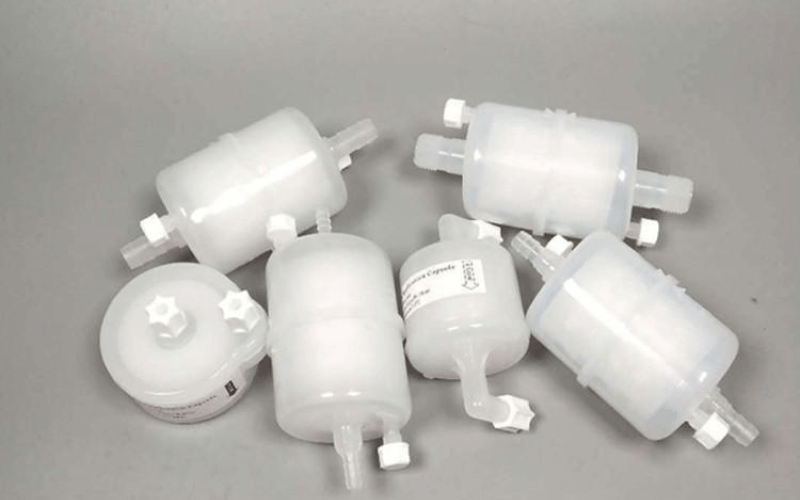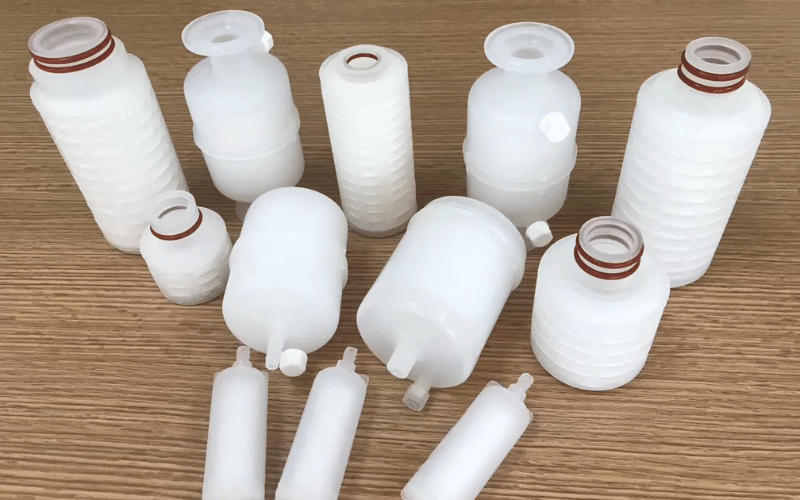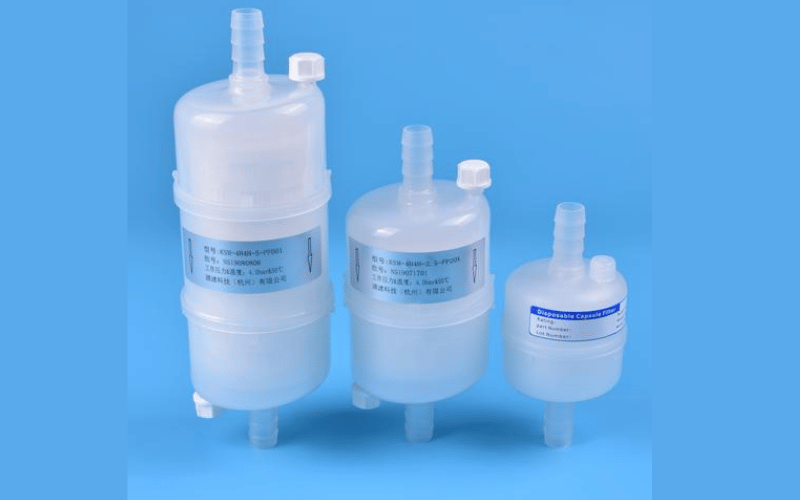Capsule filters represent a critical innovation in liquid filtration technology, combining efficiency with convenience in a compact, self-contained unit. These all-in-one filtration devices are engineered to meet the stringent purity requirements of industries where contamination control is paramount.
If you’ve ever received an intravenous medication, consumed bottled water, or used a laboratory reagent, you’ve indirectly benefited from capsule filtration technology. While they may appear as simple plastic housings to the untrained eye, the science and engineering behind these filters make them indispensable in modern manufacturing and quality control processes.
Let’s examine the construction, working principles, and diverse applications of capsule filters to understand why they’ve become the filtration solution of choice for pharmaceutical, food and beverage, and microelectronics industries.
Table of Contents
ToggleWhat is a Capsule Filter?
A capsule filter is a compact, self-contained filtration device that combines the filter media and housing into a single, sealed unit. This all-in-one design eliminates the need for separate components, simplifying installation and reducing the risk of contamination during use. Capsule filters are pre-assembled and ready to use, offering a convenient and efficient solution for a variety of applications. They are widely used in industries such as pharmaceuticals, food and beverage, and electronics, where maintaining high levels of purity and reliability is critical. Their sealed construction ensures a contamination-free process, making them ideal for sensitive or sterile environments.
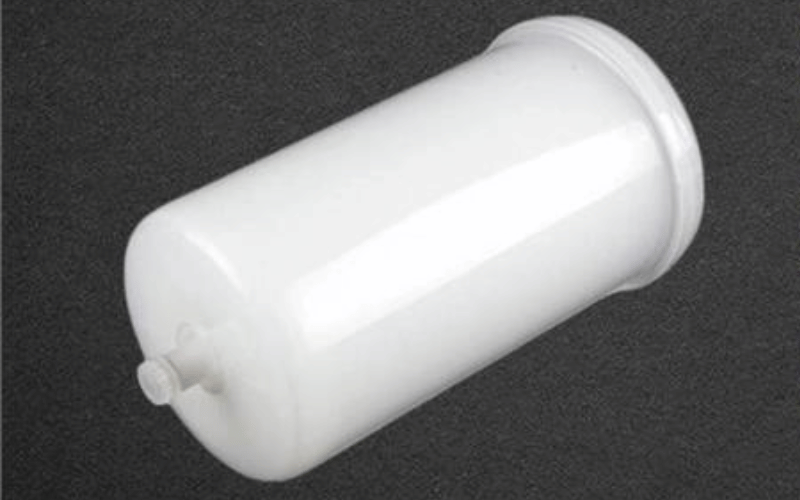
Definition and Basic Structure
Capsule filters are compact, disposable filtration devices that combine the filter media and housing into one unit. This integrated structure ensures sterility and simplifies installation, making them ideal for processes that demand high levels of cleanliness and efficiency. The sealed design also minimizes the risk of leaks or contamination during operation.
Key Components
- Filter Media:
The core of the filtration process, the filter media, is responsible for capturing particles, contaminants, or microorganisms. It is available in various materials, including polyethersulfone (PES), polytetrafluoroethylene (PTFE), polypropylene, and nylon, each selected based on specific filtration requirements. - Housing:
The outer casing of the capsule filter is typically made from durable polypropylene. This material is resistant to a wide range of chemicals, ensuring the structural integrity of the filter under varying operating conditions. The housing is free from adhesives or chemicals that could compromise sterility. - Inlet and Outlet Connections:
Capsule filters are equipped with standardized inlet and outlet connections, allowing for easy integration into existing systems. These connections ensure a secure and leak-free fit, accommodating different flow rates and system configurations.
How It Works: Filtration Process Explained
The filtration process in a capsule filter is straightforward yet highly effective. As the fluid or gas enters the filter through the inlet, it is evenly distributed across the filter media. The media’s pore structure captures particles, contaminants, or microorganisms based on its specific micron rating. The filtered fluid then exits through the outlet, free of impurities and ready for its intended use.
This process ensures consistent and reliable filtration, whether for removing sediment, sterilizing liquids, or filtering gases. The compact and sealed design of capsule filters makes them a preferred choice for applications requiring minimal maintenance and maximum efficiency.
The Significance of Capsule Filters in Filtration
Capsule filters play a vital role in modern filtration systems, offering a reliable and efficient solution for ensuring the purity of liquids and gases. Their unique design and functionality make them indispensable in industries where cleanliness, sterility, and precision are critical. By understanding their importance and advantages, it becomes clear why they are a preferred choice for a wide range of applications.
Importance of Ensuring Liquid Purity
Maintaining the purity of liquids is essential in many industries, particularly in pharmaceuticals, food and beverage production, and biotechnology. Contaminants such as particles, microorganisms, or chemical residues can compromise product quality, safety, and compliance with regulatory standards. Capsule filters are specifically designed to address these challenges by providing a sealed, contamination-free filtration process.
The integrated structure of capsule filters ensures that fluids are filtered with minimal risk of exposure to external contaminants. Their ability to capture particles as small as 0.1 microns makes them ideal for applications requiring sterile filtration, such as removing bacteria or fine particulates from liquids. This ensures that the final product meets the highest standards of purity and safety.
Advantages Over Other Filtration Methods
Capsule filters offer several advantages compared to traditional filtration systems, making them a more efficient and user-friendly option:
- Ease of Use:
Capsule filters are pre-assembled and ready to use, eliminating the need for manual assembly of filter housings and media. This reduces setup time and minimizes the risk of errors during the installation process. - Contamination-Free Design:
The sealed structure of capsule filters ensures sterility throughout the filtration process, making them ideal for sensitive applications. Unlike reusable systems, there is no risk of cross-contamination from previous uses. - Compact and Space-Saving:
Their integrated design requires less physical space and system complexity, making them suitable for smaller workspaces or mobile setups. - Disposable Convenience:
Capsule filters are single-use, which eliminates the need for cleaning and maintenance. This not only saves time but also ensures consistent performance with every use. - Versatility:
Available in a variety of materials, pore sizes, and configurations, capsule filters can be tailored to meet specific application needs, from coarse pre-filtration to critical sterilization.
Everyday Use Cases Across Industries
The versatility of capsule filters makes them suitable for a wide range of applications across various industries:
- Pharmaceuticals: Ensuring sterility in liquid filtration processes, such as removing bacteria and endotoxins from injectable solutions.
- Food and Beverage: Filtering syrups, juices, and water to remove particles and ensure product quality.
- Biotechnology: Protecting sensitive processes by removing contaminants from cell culture media or reagents.
- Electronics: Filtering ultrapure water and chemicals used in semiconductor manufacturing.
- Industrial Applications: Removing sediments and particulates from process fluids to protect equipment and improve efficiency.
By offering a combination of efficiency, reliability, and convenience, capsule filters have become a vital component in ensuring the purity and quality of liquids and gases across various industries. Their ability to meet stringent requirements while simplifying the filtration process makes them a valuable solution for modern filtration challenges.
Understanding the Difference Between Capsule Filters and Other Filter Types
When selecting a filtration solution, it’s essential to understand how capsule filters compare to other commonly used filter types, such as cartridge filters, bag filters, and membrane filters. Each type has its strengths and applications, but capsule filters stand out for their unique combination of convenience, efficiency, and versatility.
Comparison with Cartridge Filters, Bag Filters, and Membrane Filters
- Cartridge Filters:
Cartridge filters are widely used in industrial and commercial applications. They consist of a replaceable filter element housed within a reusable casing. While effective for high-volume filtration, cartridge filters require manual assembly and regular cleaning of the housing, which can increase maintenance time and the risk of contamination. -
- Key Difference: Capsule filters eliminate the need for separate housings and assembly, offering a sealed, single-use solution that reduces maintenance and ensures sterility.
- Bag Filters:
Bag filters are designed for high-capacity filtration and are commonly used in applications involving large volumes of liquid. They use a fabric bag to capture contaminants, which can then be cleaned or replaced as needed. However, bag filters are less effective for fine filtration and may not meet the sterility requirements of sensitive processes. -
- Key Difference: Capsule filters are better suited for applications requiring fine particle removal or sterile filtration, thanks to their integrated design and precise pore sizes.
- Membrane Filters:
Membrane filters are highly effective for fine filtration and are often used in laboratory and pharmaceutical settings. They rely on a thin, porous membrane to capture particles and microorganisms. However, membrane filters typically require additional housings and are less compact and user-friendly than capsule filters. -
- Key Difference: Capsule filters combine the benefits of membrane filtration with the added convenience of a pre-assembled, disposable unit, making them easier to use and more space-efficient.
Unique Benefits of Capsule Filters
Capsule filters offer several distinct advantages that set them apart from other filter types:
- Compact Design:
The integrated structure of capsule filters combines the filter media and housing into a single unit, reducing the need for additional equipment. This compact design is ideal for applications with limited space or mobile setups. - Ease of Use:
Capsule filters are pre-assembled and ready to use, eliminating the need for manual assembly or cleaning. This simplifies the filtration process and reduces the risk of errors or contamination. - Sterility Assurance:
The sealed design of capsule filters ensures a contamination-free filtration process, making them ideal for sensitive applications such as pharmaceuticals, biotechnology, and food production. - Versatility:
Available in a variety of materials, pore sizes, and configurations, capsule filters can be tailored to meet specific application needs, from coarse pre-filtration to critical sterilization. - Disposable Convenience:
As single-use units, capsule filters eliminate the need for cleaning and maintenance, saving time and ensuring consistent performance with every use.
By understanding the differences between capsule filters and other filter types, you can make an informed decision about which solution best meets your operational needs. Capsule filters are particularly well-suited for applications requiring sterility, ease of use, and compact design, making them a valuable choice for modern filtration systems.
Key Elements of a Capsule Filter
Capsule filters are designed with precision to deliver reliable and efficient filtration across a variety of applications. Each component plays a critical role in ensuring the filter’s performance, durability, and compatibility with different systems. Understanding these key elements can help you select the right filter for your specific needs.
Filter Media: Types and Applications
The filter media is the core of the filtration process, responsible for capturing particles, contaminants, and microorganisms. Capsule filters are available with different types of filter media, each suited to specific applications:
- Polypropylene (PP): Recognized for its broad chemical compatibility, polypropylene is well-suited for general-purpose filtration, including pre-filtration and industrial applications.
- PTFE (Polytetrafluoroethylene): PTFE membranes are highly resistant to aggressive chemicals and are suitable for both liquid and gas filtration. They are commonly used in applications involving solvents, acids, and high-purity gases.
- PES (Polyethersulfone): PES media offers low protein binding and high flow rates, making it ideal for sterile filtration in pharmaceuticals, biotechnology, and diagnostics.
- Nylon: Nylon membranes provide excellent mechanical strength and are well-suited for filtering organic solvents, oils, and aqueous solutions.
By selecting the appropriate filter media, you can ensure optimal performance and compatibility with your application’s requirements.
Housing: Materials and Durability
The housing of a capsule filter provides structural support and protects the filter media during operation. It is typically made from durable materials to withstand varying operating conditions:
- Plastic (Polypropylene): Lightweight and resistant to a wide range of chemicals, polypropylene housings are commonly used for most applications. They are cost-effective and provide excellent durability under standard operating conditions.
- Stainless Steel: For applications requiring higher pressure or temperature resistance, stainless steel housings offer superior strength and durability. These are often used in industrial or high-demand environments.
The choice of housing material depends on the operating conditions, including temperature, pressure, and chemical exposure.
Inlet/Outlet Connections: System Compatibility
Capsule filters are equipped with standardized inlet and outlet connections, ensuring seamless integration into existing systems. These connections are designed to accommodate different flow rates and system configurations:
- Threaded Connections: Provide a secure and leak-proof fit, commonly used in industrial setups.
- Hose Barb Connections: Allow for quick and easy installation, ideal for laboratory or small-scale applications.
- Sanitary Connections: Designed for sterile environments, these connections ensure contamination-free operation in pharmaceutical and food processing systems.
Ensuring compatibility between the filter’s connections and your system is essential for efficient and reliable filtration.
Sealing Mechanisms: Ensuring Leak-Proof Operation
The sealing mechanism of a capsule filter is critical for maintaining a leak-proof and contamination-free filtration process. High-quality seals prevent fluid or gas from bypassing the filter media, ensuring that all contaminants are effectively captured.
- Welded Seals: Provide a permanent and robust seal, eliminating the risk of leaks during operation.
- O-Ring Seals: Commonly used in reusable systems, O-rings offer flexibility and ease of replacement but may require regular inspection for wear.
- Adhesive-Free Seals: Many capsule filters are designed without adhesives to prevent chemical leaching and ensure sterility, particularly in sensitive applications.
By choosing a filter with reliable sealing mechanisms, you can maintain the integrity of your filtration process and prevent operational disruptions.
Understanding the key elements of a capsule filter—filter media, housing, connections, and sealing mechanisms—ensures that you select a solution tailored to your specific application. Each component is designed to optimize performance, durability, and compatibility, making capsule filters a versatile and dependable choice for modern filtration systems.
How Does a Capsule Filter Work?
Capsule filters are designed to provide efficient and reliable filtration by combining advanced filtration media with a compact, sealed design. Understanding how these filters operate can help you optimize their performance and ensure consistent results in your application. Below is a detailed explanation of the filtration process, flow dynamics, and maintenance considerations.
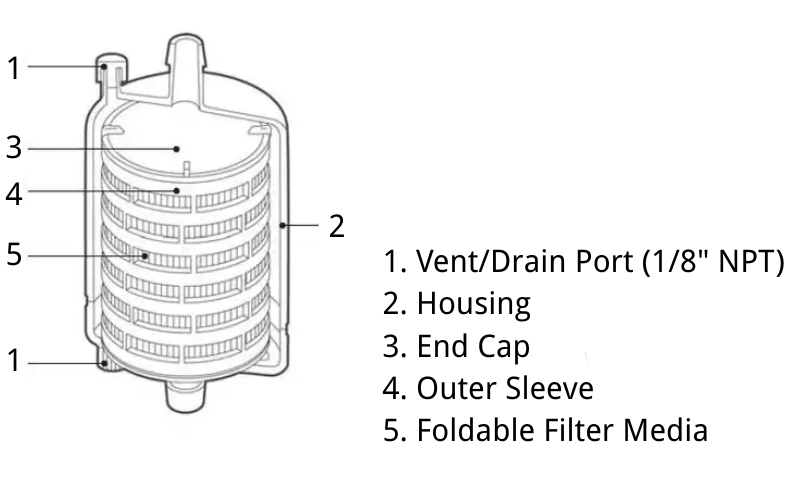
Step-by-Step Explanation of the Filtration Process
- Fluid Entry:
The filtration process begins when the liquid or gas enters the capsule filter through the inlet connection. The inlet is designed to evenly distribute the fluid across the filter media, ensuring uniform filtration. - Particle Capture:
As the fluid passes through the filter media, particles, contaminants, and microorganisms are trapped based on the pore size of the media. The filter media is engineered to provide precise retention, capturing particles as small as 0.1 microns for sterile filtration or larger particles for pre-filtration. - Filtered Output:
Once the fluid has been purified, it exits the filter through the outlet connection. The filtered liquid or gas is now free of impurities and ready for its intended use, whether in pharmaceutical production, food processing, or industrial applications.
This straightforward yet effective process ensures consistent filtration performance while minimizing the risk of contamination.
Flow Dynamics and Particle Retention
The flow dynamics within a capsule filter are carefully designed to maximize efficiency and minimize pressure drops.
- Optimized Flow Path:
The internal structure of the filter ensures that the fluid flows evenly across the entire surface area of the filter media. This prevents channeling, where fluid bypasses certain regions of the media, and ensures that all contaminants are captured. - Particle Retention:
The filter media’s pore size and gradient density play a critical role in particle retention. Smaller pores capture fine particles and microorganisms, while larger pores in pre-filtration layers handle coarse contaminants. This multi-layered approach enhances the filter’s dirt-holding capacity and extends its operational life. - Pressure Considerations:
Maintaining the recommended pressure range is essential for optimal performance. Excessive pressure can force contaminants through the media, reducing filtration efficiency, while insufficient pressure may result in incomplete filtration.
By understanding the flow dynamics and retention capabilities of capsule filters, you can ensure they operate at peak efficiency.
Maintenance and Replacement Process
Proper maintenance and timely replacement of capsule filters are crucial for maintaining their performance and extending their lifespan.
- Monitoring Performance:
Regularly check system parameters such as pressure differentials and flow rates. A significant increase in pressure drop or a decrease in flow rate indicates that the filter is nearing its capacity and may need replacement. - Replacement Guidelines:
Capsule filters are typically single-use and should be replaced once they reach their maximum dirt-holding capacity. For critical applications, such as sterile filtration, it’s recommended to replace the filter after each use to ensure sterility. - Disposal:
Dispose of used capsule filters according to local regulations and industry standards. Many filters are designed to be environmentally friendly and can be safely discarded after use.
By following these maintenance and replacement practices, you can ensure consistent filtration performance and prevent operational disruptions.
Understanding how a capsule filter works—from the filtration process to flow dynamics and maintenance—can help you make the most of this efficient and versatile filtration solution. With proper use and care, capsule filters provide reliable performance across a wide range of applications, ensuring the purity and quality of your process fluids.
Advantages of Capsule Filters
Capsule filters have become a preferred choice for many industries due to their innovative design and practical benefits. Their unique features make them an efficient and reliable solution for a wide range of filtration needs. Below, we examine the key advantages of capsule filters and their contributions to enhanced operational efficiency and performance.
Compact and Lightweight Design
One of the standout features of capsule filters is their compact and lightweight structure. Unlike traditional filtration systems that require separate housings and filter elements, capsule filters integrate these components into a single, sealed unit.
- Space-Saving: The compact design makes them ideal for applications with limited space, such as laboratories, mobile setups, or small-scale production lines.
- Ease of Handling: Their lightweight construction enables easy installation, transportation, and replacement, thereby reducing the physical effort required during operations.
This streamlined design not only simplifies the filtration process but also enhances the system’s overall efficiency.
Ready-to-Use and Disposable
Capsule filters are pre-assembled and ready to use straight out of the package, eliminating the need for time-consuming setup or assembly.
- Convenience: The sealed, disposable design ensures sterility and reduces the risk of contamination during installation or operation.
- No Maintenance Required: Since they are single-use, there is no need for cleaning or maintenance, saving time and resources.
- Hygienic Operation: The disposable nature of capsule filters makes them particularly suitable for applications requiring strict sterility, such as pharmaceuticals or food and beverage production.
This ready-to-use feature simplifies workflows and ensures consistent performance with every use.
High Filtration Efficiency
Capsule filters are engineered to deliver exceptional filtration performance, making them suitable for both coarse and fine filtration applications.
- Advanced Filter Media: The use of high-quality materials, such as PES, PTFE, or polypropylene, ensures precise particle retention and reliable filtration.
- Multi-Layered Design: Many capsule filters feature a gradient density structure that captures particles of varying sizes, maximizing dirt-holding capacity.
- Consistent Results: The sealed design prevents bypassing, ensuring that all fluid passes through the filter media for thorough purification.
This high level of efficiency makes capsule filters a dependable choice for critical applications requiring consistent and reliable results.
Versatility in Handling Different Liquids
Capsule filters are designed to accommodate a wide range of liquids and operating conditions, making them highly versatile.
- Chemical Compatibility: Available in various materials, capsule filters can handle a wide range of solutions, from water-based to aggressive chemicals and solvents.
- Wide Application Range: They are utilized in various industries, including pharmaceuticals, biotechnology, food and beverage, electronics, and industrial processes.
- Customizable Options: With different pore sizes, lengths, and connection types, capsule filters can be tailored to meet specific filtration requirements.
This adaptability ensures that capsule filters can be effectively utilized across a wide range of applications and industries.
Cost-Effectiveness for Small-Scale Operations
For small-scale operations or batch processes, capsule filters offer a cost-effective solution without compromising on performance.
- Lower Initial Investment: Unlike reusable systems that require separate housings and cleaning equipment, capsule filters are a single-unit solution with no additional setup costs.
- Reduced Downtime: The disposable design eliminates the need for cleaning, allowing for quicker changeovers and uninterrupted workflows.
- Efficient Resource Use: By selecting the appropriate filter size and type, businesses can minimize waste and optimize filtration costs.
This cost-effectiveness makes capsule filters an attractive option for small-scale or budget-conscious operations.
Capsule filters combine convenience, efficiency, and versatility, making them a valuable addition to modern filtration systems. Their compact design, ready-to-use functionality, high filtration efficiency, and adaptability to different liquids ensure they meet the demands of various industries. Whether for small-scale operations or critical applications, capsule filters provide a reliable and cost-effective solution for achieving optimal filtration results.
Types of Capsule Filters
Capsule filters are available in various types, each designed to meet the specific requirements of a particular application. From ensuring sterility in sensitive environments to handling aggressive chemicals, these filters provide tailored solutions for a diverse range of industries. Below, we explore the main types of capsule filters and their applications.
Sterile Capsule Filters: For Pharmaceutical and Medical Applications
Sterile capsule filters are specifically designed to meet the stringent requirements of pharmaceutical, medical, and biotechnology industries. These filters ensure the removal of bacteria, endotoxins, and other microorganisms, making them essential for processes requiring absolute sterility.
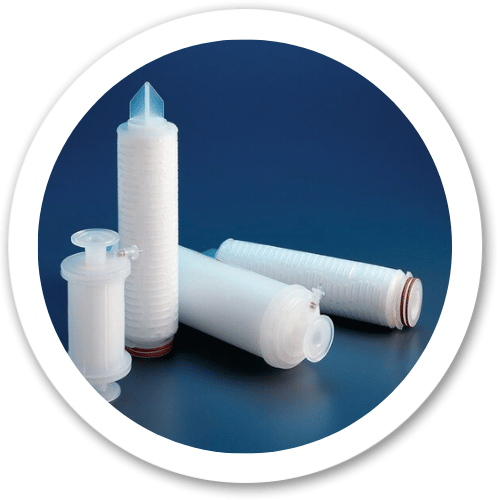
- Applications:
-
- Filtration of injectable solutions, vaccines, and cell culture media.
- Sterilization of liquids and gases in laboratory and production environments.
- Key Features:
-
- Constructed with low protein-binding materials like PES to preserve biological integrity.
- Validated for sterilization methods, including autoclaving and steam-in-place (SIP).
- Compliant with regulatory standards like USP Class VI and FDA requirements.
Sterile capsule filters provide reliable performance in critical applications where purity and safety are paramount.
High-Flow Capsule Filters: For Industrial Processes
High-flow capsule filters are designed to handle large volumes of liquid or gas efficiently, making them ideal for industrial and manufacturing processes. These filters are designed to maintain high throughput while ensuring effective removal of contaminants.
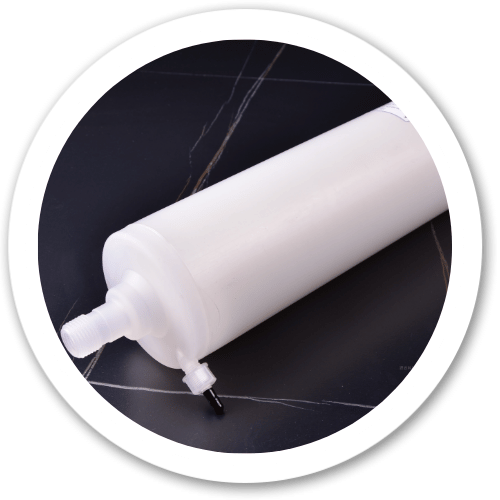
- Applications:
-
- Pre-filtration in water treatment systems.
- Filtration of process fluids in chemical and petrochemical industries.
- Removal of sediments and particulates in large-scale operations.
- Key Features:
-
- High dirt-holding capacity to reduce the frequency of filter replacements.
- Optimized flow paths to minimize pressure drops and maintain consistent performance.
- Durable construction to withstand demanding operating conditions.
High-flow capsule filters are a cost-effective solution for industries requiring efficient filtration of high volumes.
Chemical-Resistant Capsule Filters: For Aggressive Liquids
Chemical-resistant capsule filters are engineered to handle harsh chemicals, solvents, and extreme pH levels without compromising performance or durability. These filters are essential for applications involving aggressive or corrosive fluids.
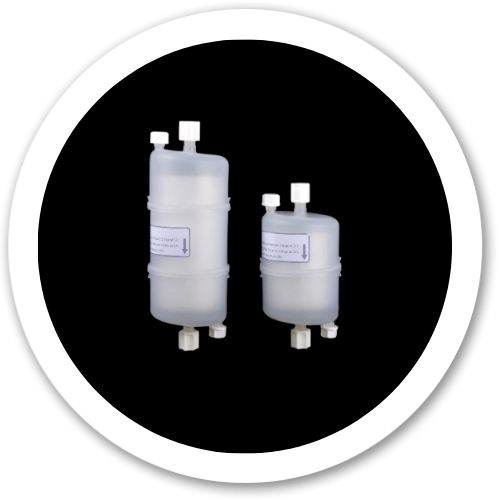
- Applications:
-
- Filtration of acids, bases, and organic solvents in chemical processing.
- Gas filtration in semiconductor manufacturing.
- Protection of sensitive equipment from corrosive contaminants.
- Key Features:
-
- Constructed with materials like PTFE or polypropylene for excellent chemical compatibility.
- Resistant to high temperatures and pressure variations.
- Available in hydrophobic and hydrophilic configurations for versatile use.
Chemical-resistant capsule filters ensure safe and efficient filtration in challenging environments.
Customizable Capsule Filters: Tailored for Specific Needs
Customizable capsule filters are designed to meet the unique requirements of specialized applications. These filters can be tailored in terms of size, material, pore size, and connection type to provide a perfect fit for specific processes.
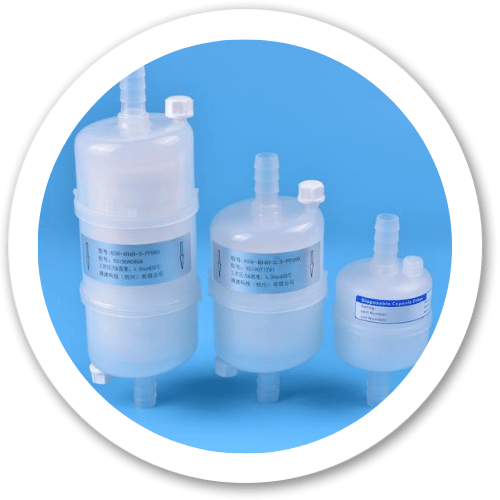
- Applications:
-
- Filtration systems are used in niche industries such as aerospace, electronics, or cosmetics.
- Processes requiring unique configurations or non-standard operating conditions.
- Key Features:
-
- Wide range of filter media options to suit different fluid types and contaminants.
- Customizable inlet and outlet connections for seamless integration into existing systems.
- Flexible design options to accommodate specific flow rates, pressures, and filtration goals.
Customizable capsule filters offer unparalleled flexibility, ensuring optimal performance in even the most demanding applications.
By understanding the different types of capsule filters—sterile, high-flow, chemical-resistant, and customizable—you can select the ideal solution for your specific needs. Each type is designed to address unique challenges, providing reliable and efficient filtration across a wide range of industries and applications.
Applications of Capsule Filters
Capsule filters are versatile and widely used across various industries due to their efficiency, reliability, and adaptability. Their ability to handle diverse filtration needs makes them a crucial component in processes that require precision and consistency. Below, we examine the key applications of capsule filters across various sectors.
Pharmaceutical Industry: Sterile Filtration of Drugs and Solutions
In the pharmaceutical industry, maintaining sterility is critical to ensuring the safety and efficacy of drugs and medical solutions. Capsule filters are specifically designed to meet these stringent requirements.
- Applications:
-
- Filtration of injectable drugs, vaccines, and intravenous solutions.
- Removal of bacteria, endotoxins, and particulates from liquid formulations.
- Sterilization of gases used in pharmaceutical production.
- Key Benefits:
-
- Constructed with low protein-binding materials like PES to preserve the integrity of sensitive compounds.
- Compliant with regulatory standards, including USP Class VI and FDA guidelines.
- Single-use design eliminates the risk of cross-contamination.
Capsule filters ensure the highest levels of sterility and purity in pharmaceutical processes.
Food and Beverage Industry: Filtration of Liquids Like Syrups, Juices, and Water
In the food and beverage sector, filtration is essential for maintaining product quality, safety, and consistency. Capsule filters are widely used to remove impurities and ensure the clarity of liquids.
- Applications:
-
- Filtration of syrups, juices, and soft drinks to remove sediments and particulates.
- Purification of water used in beverage production.
- Removal of microorganisms to extend product shelf life.
- Key Benefits:
-
- Made from food-grade materials to ensure compliance with industry standards.
- High dirt-holding capacity reduces the frequency of filter replacements.
- The compact design enables easy integration into production lines.
Capsule filters help maintain the taste, appearance, and safety of food and beverage products.
Biotechnology: Filtration of Cell Cultures and Media
In biotechnology, precision and sterility are crucial for successful research and production. Capsule filters play a vital role in protecting cell cultures and ensuring the purity of media.
- Applications:
-
- Filtration of cell culture media to remove contaminants and ensure sterility.
- Protection of bioreactors from particulates and microorganisms.
- Filtration of reagents and buffers used in laboratory processes.
- Key Benefits:
-
- Low extractable levels preserve the integrity of sensitive biological materials.
- Available in a range of pore sizes to meet specific filtration needs.
- Disposable design minimizes the risk of contamination.
Capsule filters support the advancement of biotechnology by ensuring clean and sterile environments.
Chemical Processing: Filtration of Aggressive Chemicals and Solvents
In chemical processing, filtration is essential for protecting equipment and ensuring the quality of end products. Capsule filters are designed to handle aggressive chemicals and challenging operating conditions.
- Applications:
-
- Filtration of acids, bases, and organic solvents.
- Removal of particulates from process fluids to protect sensitive equipment.
- Gas filtration in chemical manufacturing processes.
- Key Benefits:
-
- Constructed with chemically resistant materials like PTFE and polypropylene.
- Withstand high temperatures and pressure variations.
- Available in hydrophobic and hydrophilic configurations for versatile use.
Capsule filters ensure safe and efficient filtration in demanding chemical environments.
Water Treatment: Removal of Particulates and Impurities
In water treatment systems, capsule filters are used to improve water quality by removing particulates, sediments, and other impurities.
- Applications:
-
- Pre-filtration in reverse osmosis systems.
- Removal of sediments and debris from industrial water supplies.
- Filtration of potable water to meet safety standards.
- Key Benefits:
-
- High flow rates and dirt-holding capacity for efficient filtration.
- Durable construction ensures long-lasting performance.
- Compact design allows for easy installation in water treatment setups.
Capsule filters contribute to cleaner and safer water for use in industrial, commercial, and residential settings.
By understanding the diverse applications of capsule filters in industries such as pharmaceuticals, food and beverage, biotechnology, chemical processing, and water treatment, it’s clear that these filters are an indispensable tool for achieving reliable and efficient filtration. Their adaptability and performance make them a trusted solution for maintaining quality and safety across various processes.
Choosing the Right Capsule Filter
Selecting the appropriate capsule filter is essential to ensure optimal performance and efficiency in your filtration process. With various options available, understanding the key factors and considerations can help you make an informed decision tailored to your specific requirements.
Factors to Consider
When choosing a capsule filter, it’s important to evaluate several critical factors to ensure compatibility and effectiveness:
- Flow Rate:
-
- The flow rate of the filter should match the requirements of your system.
- Filters with higher flow rates are ideal for industrial applications, while lower flow rates may be sufficient for laboratory or small-scale processes.
- Consider the pressure drop across the filter to maintain consistent performance without overloading the system.
- Compatibility:
-
- Ensure the filter materials are compatible with the fluid or gas being filtered.
- For aggressive chemicals or solvents, select filters made from resistant materials, such as PTFE or polypropylene.
- Verify temperature and pressure limits to avoid compromising the filter’s integrity during operation.
- Pore Size:
-
- The pore size of the filter media determines its ability to capture particles and contaminants.
- For sterile filtration, choose filters with smaller pore sizes (e.g., 0.1 or 0.2 microns) to remove bacteria and microorganisms.
- Larger pore sizes are suitable for pre-filtration or applications involving coarse particles.
- Application:
-
- Consider the specific requirements of your application, such as sterility, chemical resistance, or high flow capacity.
- For critical industries like pharmaceuticals or biotechnology, ensure the filter complies with regulatory standards such as USP Class VI or FDA guidelines.
- Evaluate whether a single-use or reusable filter is more appropriate for your process.
By carefully assessing these factors, you can select a filter that meets your operational needs while ensuring reliable and efficient filtration.
Tips for Selecting the Best Filter for Your Needs
To simplify the selection process, follow these practical tips to identify the most suitable capsule filter for your application:
- Define Your Filtration Goals:
-
- Determine whether you need sterile filtration, particle removal, or chemical compatibility.
- Identify the contaminants you aim to remove and the level of filtration required.
- Consult Product Specifications:
-
- Review the manufacturer’s specifications for flow rate, pressure limits, and material compatibility.
- Look for filters that have been validated for your specific application to ensure optimal performance.
- Test for Compatibility:
-
- Conduct compatibility tests with your fluid or gas to confirm the filter’s suitability.
- Pre-flush the filter to remove potential extractables and ensure it meets your quality standards.
- Consider Long-Term Costs:
-
- Evaluate the cost-effectiveness of the filter, including replacement frequency and operational efficiency.
- For high-frequency usage, consider filters with high dirt-holding capacity to reduce downtime and replacement costs.
- Seek Expert Guidance:
-
- Consult with technical support teams or filtration experts to identify the best filter for your unique requirements.
- Leverage their expertise to address specific challenges or customize filters for specialized applications.
Choosing the right capsule filter involves balancing several key factors, including flow rate, compatibility, pore size, and specific application needs. By following these guidelines and tips, you can ensure that your filtration system operates efficiently and delivers consistent, high-quality results. Whether for industrial processes, sterile environments, or chemical applications, selecting the right filter is key to achieving reliable and effective filtration.
The Bottom Line
Capsule filters have revolutionized liquid filtration by combining reliability with convenience in a single, validated package. Their standardized designs and consistent performance make them ideal for critical applications where product purity cannot be compromised.
From life-saving medications to the microchips that power our digital world, capsule filters play a vital yet often unseen role in modern manufacturing. Their ability to maintain sterility while handling aggressive chemicals and high flow rates makes them indispensable across multiple industries.
Ready to upgrade your filtration process? Our comprehensive range of capsule filters provides solutions for every application, accompanied by expert technical support to help you select the ideal configuration. Contact us today to discuss how capsule filtration can improve your product quality and process efficiency.
When absolute filtration reliability matters, trust capsule filters to deliver consistent, validated performance, batch after batch.


